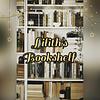You need to sign in or sign up before continuing.
Take a photo of a barcode or cover
adventurous
funny
inspiring
tense
medium-paced
Plot or Character Driven:
Character
Strong character development:
Yes
Loveable characters:
Yes
Diverse cast of characters:
Yes
Flaws of characters a main focus:
No
Este libro me gustó más de lo que esperaba. Es muy diferente a la película de Disney, pero tiene su propia magia. Mowgli es un niño travieso con un profundo deseo de pertenecer, y aunque ser un “cachorro de hombre” lo hace distinto a su familia en la selva, también es lo que le permite encontrar su verdadero lugar.
Baloo y Bagheera me encantaron—son leales, sabios y tiernos a su manera. Sin duda, Mowgli no habría llegado tan lejos sin ellos.
Una lectura entretenida y sorprendentemente profunda.
Baloo y Bagheera me encantaron—son leales, sabios y tiernos a su manera. Sin duda, Mowgli no habría llegado tan lejos sin ellos.
Una lectura entretenida y sorprendentemente profunda.
adventurous
inspiring
reflective
medium-paced
I read this based on the recommendation of Neil Gaiman (he talks about it being an influence in his writing of The Graveyard Book, which is one of my favorites). Some of the influence is very clear, but Gaiman definitely goes his own way, especially since The Graveyard book is short stories that make one large overarching story, which is not the case with The Jungle Book. At first, I wasn't sure if I liked that-after the first hundred pages or so, Mowgli disappears from the story! But I really enjoyed some of the Mowgli-free stories, especially Rikki-Tikki-Tavi and Her Majesty's Servants. And I loved the songs included in the book. I should point out that apparently Mowgli reappears in the sequel, which I may have to check out.
This is definitely a book that will appeal to children in a lot of ways, but the language is definitely different that what you'd hear in a children's book today. It took me awhile to really get the hang of how everyone was talking. Also, there's some pretty gruesome jungle violence (I was particularly freaked out by a trampling/skinning incident, although a lot of kids are less squeamish about that sort of thing than I am). I'm really interested to see how the two new (and totally unrelated) movies adapt the Jungle Book. I didn't see much of the Disney cartoon version here.
This is definitely a book that will appeal to children in a lot of ways, but the language is definitely different that what you'd hear in a children's book today. It took me awhile to really get the hang of how everyone was talking. Also, there's some pretty gruesome jungle violence (I was particularly freaked out by a trampling/skinning incident, although a lot of kids are less squeamish about that sort of thing than I am). I'm really interested to see how the two new (and totally unrelated) movies adapt the Jungle Book. I didn't see much of the Disney cartoon version here.
(ελληνικά στο δεύτερο σκέλος)
Forget everything you think you know about The Jungle Book.
If your only point of reference is the Disney rendition of Mowgli — charming, melodic, and entirely sanitised — kindly proceed to erase your memory. Perform a full mental format. Place that hard drive in the microwave on "max" for half an hour. Let us begin anew.
Shock the First: Kipling’s The Jungle Book is far more than the story of Mowgli — whose arc, incidentally, occupies merely two of the collection’s tales.
Shock the Second: Shere Khan, fearsome tiger, meets his end not in a climactic personal battle, but by being trampled to death by buffalo. A demise oddly reminiscent of another fallen feline patriarch in Disney’s cinematic canon — yes, Mufasa.
But let us proceed with proper decorum and chronology. Rudyard Kipling’s The Jungle Book, first published in 1894, comprises a series of short stories, and stands today as a quintessential artefact of British imperial literature. And when I say "imperial," I do not do so lightly. However fond we may be of Kipling’s literary flair, he remains, unavoidably, a product of his time and empire — a man for whom planting a flag was tantamount to a declaration of divine right. ("No flag? Ah, splendid — we’ll just affix ours here. Congratulations, you’re now British.")
Though popularly imagined as a children’s tale, The Jungle Book is, in truth, a sophisticated mosaic of narratives, replete with moral instruction and veiled (or not-so-veiled) political subtext — many of which may sit uneasily with the sensibilities of the 21st-century adult reader.
As previously noted, Mowgli’s adventures — the boy reared by wolves — are not the sole content of the work. Indeed, they are arguably the least overtly colonial in flavour (on the surface, at least — a closer reading invites further speculation). The book includes several equally important stories, each accompanied by verse, underscoring Kipling’s dual aim: to address both the youthful and the morally contemplative adult reader. That is, readers with a concern for law, order, and the so-called greater good — as Kipling, of course, defined these terms.
One of the more striking themes is the famed “Law of the Jungle”: a symbolic code governing the animal realm — which, spoiler alert, is not nearly as wild as it appears. It is, rather, rigorously structured, rule-bound, and intolerant of deviation. Discipline and obedience are paramount, and those who defy the law — such as the anarchic monkey-folk who abduct Mowgli — are swiftly rendered outcasts and legitimate prey. Enter Baloo, Bagheera, and the titanic python Kaa, who dispense jungle justice with admirable efficiency. In other words: stray from the flock, and you’re fair game.
Kipling’s prose is vivid and rhythmically engaging — brimming with imagery and a strong narrative cadence. Nevertheless, any contemporary reading must contend with the ideological undertones. The text often betrays an unapologetic admiration for hierarchy, authority, and the subjugation of the "Other" — ideals closely aligned with the ethos of British imperial rule.
And yet, for all its ideological provocations, The Jungle Book endures as a work of literary merit, layered in meaning and rich in aesthetic quality. It straddles myth, morality, and politics — and, for that reason, continues (or ought to continue) to be read and discussed not only by children, but by adults with a taste for nuance and an eye for the uncomfortable truths that literature sometimes reveals.
Forget everything you think you know about The Jungle Book.
If your only point of reference is the Disney rendition of Mowgli — charming, melodic, and entirely sanitised — kindly proceed to erase your memory. Perform a full mental format. Place that hard drive in the microwave on "max" for half an hour. Let us begin anew.
Shock the First: Kipling’s The Jungle Book is far more than the story of Mowgli — whose arc, incidentally, occupies merely two of the collection’s tales.
Shock the Second: Shere Khan, fearsome tiger, meets his end not in a climactic personal battle, but by being trampled to death by buffalo. A demise oddly reminiscent of another fallen feline patriarch in Disney’s cinematic canon — yes, Mufasa.
But let us proceed with proper decorum and chronology. Rudyard Kipling’s The Jungle Book, first published in 1894, comprises a series of short stories, and stands today as a quintessential artefact of British imperial literature. And when I say "imperial," I do not do so lightly. However fond we may be of Kipling’s literary flair, he remains, unavoidably, a product of his time and empire — a man for whom planting a flag was tantamount to a declaration of divine right. ("No flag? Ah, splendid — we’ll just affix ours here. Congratulations, you’re now British.")
Though popularly imagined as a children’s tale, The Jungle Book is, in truth, a sophisticated mosaic of narratives, replete with moral instruction and veiled (or not-so-veiled) political subtext — many of which may sit uneasily with the sensibilities of the 21st-century adult reader.
As previously noted, Mowgli’s adventures — the boy reared by wolves — are not the sole content of the work. Indeed, they are arguably the least overtly colonial in flavour (on the surface, at least — a closer reading invites further speculation). The book includes several equally important stories, each accompanied by verse, underscoring Kipling’s dual aim: to address both the youthful and the morally contemplative adult reader. That is, readers with a concern for law, order, and the so-called greater good — as Kipling, of course, defined these terms.
One of the more striking themes is the famed “Law of the Jungle”: a symbolic code governing the animal realm — which, spoiler alert, is not nearly as wild as it appears. It is, rather, rigorously structured, rule-bound, and intolerant of deviation. Discipline and obedience are paramount, and those who defy the law — such as the anarchic monkey-folk who abduct Mowgli — are swiftly rendered outcasts and legitimate prey. Enter Baloo, Bagheera, and the titanic python Kaa, who dispense jungle justice with admirable efficiency. In other words: stray from the flock, and you’re fair game.
Kipling’s prose is vivid and rhythmically engaging — brimming with imagery and a strong narrative cadence. Nevertheless, any contemporary reading must contend with the ideological undertones. The text often betrays an unapologetic admiration for hierarchy, authority, and the subjugation of the "Other" — ideals closely aligned with the ethos of British imperial rule.
And yet, for all its ideological provocations, The Jungle Book endures as a work of literary merit, layered in meaning and rich in aesthetic quality. It straddles myth, morality, and politics — and, for that reason, continues (or ought to continue) to be read and discussed not only by children, but by adults with a taste for nuance and an eye for the uncomfortable truths that literature sometimes reveals.
adventurous
emotional
funny
lighthearted
tense
medium-paced
Plot or Character Driven:
A mix
Strong character development:
Yes
Loveable characters:
Complicated
Diverse cast of characters:
N/A
Flaws of characters a main focus:
N/A
fast-paced
Plot or Character Driven:
Character
Strong character development:
Yes
Loveable characters:
Complicated
Diverse cast of characters:
Yes
Flaws of characters a main focus:
No
adventurous
lighthearted
fast-paced
dark
slow-paced
I love the Disney movie so obviously when thirteen year old me found a copy of The Jungle Book book I had to read it. It is a lot darker than the movie but it is a fun and brilliant written look at India and Indian culture. A great read.
Rudyard Kipling's The Jungle Book is quite different than Disney's versions. I have been trying to read the children's classics with my kids so they can see the difference between the book and movie versions of their favorite stories. This story was well written and interesting. The characters do speak in old English, which my kids found quite entertaining! I'm glad we read this!





